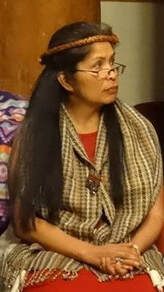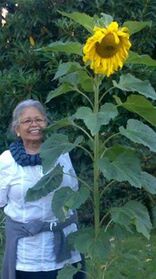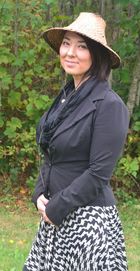|
Shelly Vendiola, Swinomish / Visayan (Co-founder)
Michele Vendiola, known by her nickname--Shelly, is Swinomish and Visayan. Shelly has served as an educator, facilitator, activist, and mediator for over 30 years. She co-founded the native Community Engagement and Peacemaking Project and provides facilitation and community engagement services in strategic planning, dispute resolution, and peacemaking circles throughout the country. She currently works as the Indigenous Leadership Programs Consultant at the Na’ah Illahee Fund, and serves on the board of the Indigenous Environmental Network and the Na’a Kaani Native Programs. As a consultant, she continues to work in partnership with the Swinomish Department of Environmental Protection as a Co-Chair on their Protect Mother Earth Subcommittee and is a member of the Swinomish Higher Education Community Advisory Board. Shelly developed a place-based curriculum about the history and culture of the Swinomish peoples and taught a series of cultural sovereignty courses for over 10 years at the NWIC Coast Salish Institute - Native Studies Leadership Program and is helping to develop a Swinomish Lushootseed Language Program for the tribe. Previously her team provided leadership and consultation for the Lummi Cedar Project - Organized Generations Healthy Lifestyles Program. Ms. Vendiola served as President for the national Indigenous Women's Network and a Campaign Director for the Indigenous Environmental Network. Shelly received several years of formal dispute resolution training from the Indian Dispute Resolution Services, Inc.and the SF Community Boards Program. She has an M.Ed. in Higher Education and practices indigenous pedagogy and indigenous research methodology within all aspects of her work. Shelly practices the ancient form of meditation known as Qi Gong daily for balance, energy, and resiliency. Her motto is, "There is nothing permanent in the world but change, the key is how we flow with it!" |
|
Diane Vendiola, Swinomish / Filipina (Co-founder)
Diane Vendiola, is a retired Minority Behavioral Health Specialist and served as a supervisor and counselor for the Swinomish Tribal Mental Health Program for 20 years. She also served as a Tribal Peacemaker for Northwest Intertribal Court System since 1985, and has facilitated meetings and meditations for tribal organizations, individuals, and families. She developed conflict resolution trainings for school staff serving Native Americans, Native American parent groups, youth organizations and tribal leaders, as well as tribal social service providers. Diane is currently providing services to Native American individuals and families residing in Skagit County, and cultural consultation to area mental health service providers working with Native American and/or Filipino American clients. Diane was born and raised in Seattle’s International District and is the mother of five adult offspring,. She has been a long-time advocate for American Indian mental health and education programs based on cultural values with mainstream services as an adjunct. Diane is a great grandmother to 2 great-grand children, and has 9 grandchildren and 5 adult children, and is an elder Auntie to many. She received her A.A. degree from Skagit Valley College, and an honorary degree from Western Washington State University. Four of her adult children hold Master degrees in Education and one has a Bachelor’s degree in English-Writing. And two of her grandchildren have college degrees. Diane considers herself a life-long learner and teaches many young people the importance of celebrating life and wellness. |
|
Shasta Cano-Martin, Lhaq'temish (Lummi)
Shasta Cano-Martin (Lummi) was a former council woman elected to the Lummi Indian Business Council in 2013. As the Secretary of the council she served her tribal nation with a wealth of leadership experience. Currently, Shasta serves in the restorative justice program of the tribal court and is a member of the Board of the Center for Ethical Leadership and the Lummi Cultural Arts Association. Previously, she served on the Board of Directors for the Bellingham YWCA; Whatcom County Council of Governments’ Community Transportation Advisory Group; Lummi Planning Commission; and the Lummi Ventures Program. Shasta has held a number of other leadership roles with the Lummi Nation, including serving as Executive Director of the Lummi CEDAR Project, a native non-profit organization geared towards youth leadership and development. The CEDAR Project unites respected tribal elders, steeped in Lummi traditions and values, with Lummi youth, who carry the Nation’s dreams and aspirations. With their elders’ support, tribal youth lead positive change throughout the Lummi Reservation and beyond. Shasta is a skilled facilitator and has a Master of Education from Western Washington University. |
Ellany Kayce, Tlingit
|




